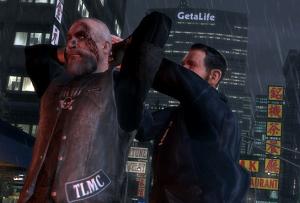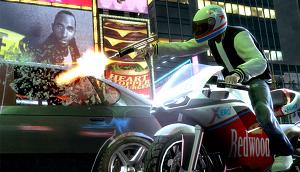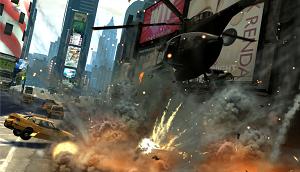Solo Gamer Review: Grand Theft Auto: Episodes from Liberty City
Solo Gamer Reviews are dedicated to the gamer who does not play well with others, doesn't care about multiplayer modes in his or her games, and who absolutely despises things like multiplayer achievement points. These are reviews for guys and gals who prefer to play with themselves, and thus games will be penalized if developers spend more time on slayer deathmatch options than on the single-player experience. We solo gamers prefer a well-thought-out story, an immersive universe, and hours upon hours of enjoyment without having to shoot an endless horde of twelve-year-old punks in the head over the Internet. So throw away your WiiSpeak and your X-Box Live headset, and all hail the solo gamer!
Playing Episodes from Liberty City feels a lot like going home for those who played through Grand Theft Auto IV. While not the same experience, the stories of Johnny Klebitz and Luis Lopez are an organic extension of Niko Bellic's, and anyone who feels nostalgic for Liberty City in the bygone days of early 2008 owes it to himself (or herself) to pick up this addition to an already enormous game. Luckily, though you can certainly purchase the two episodes over Xbox Live, they now come as a stand-alone disc that doesn't even require you to own the original game. The package will cost you a measly $39.99 at retail, and considering the sheer amount of content involved, that is a fantastic deal.
STORY
 | | The leader of The Lost is a genuine whack-job |
The two stories included in Episodes from Liberty City are concurrent with Niko's original tale, occasionally even intersecting. The first is the tale of Johnny Klebitz, the second-in-command of a biker gang called The Lost. His episode, The Lost and Damned, begins with the gang leader, Billy Grey, getting released from prison and taking charge of The Lost once more. Under Johnny's leadership (while Billy was away), The Lost was living a relatively quiet and peaceful existence, but as soon as Billy is free, he starts doing drugs, shooting people, and igniting a war with a rival gang.
Johnny isn't as despicable as other reviews have stated, though he clearly lacks Niko's charm and pseudo-innocence. He does many questionable and outrageous things, but he also tries (and fails) to keep the peace and maintain order. As hardcore outlaw bikers go, Johnny's about as good as they come, and he makes for an interesting protagonist. His story has one or two good twists in it, and the momentum never lets up. It is ultimately a simple and straightforward tale, though, with an ending that you may find a bit lacking.
It is followed by the story of Luis Lopez in The Ballad of Gay Tony, the second--and much larger--episode on the disc. Luis is another character with an outlaw background, though it feels like much of his own story remains in the past. His journey, it turns out, has much more to do with his friend and soon-to-be-has-been club owner, Gay Tony. Tony owes money to a lot of unsavory types, so the story naturally involves Luis doing all sorts of illegal activities in order to pay off Tony's debts. These illegal activities are the most outrageous missions in all of Grand Theft Auto IV in that they involve blowing up helicopters, driving tanks, and killing several hundred cops so that a Russian mobster can own the local hockey team. It's as over-the-top as can be, and makes for an awesome final encore to the game.
GAMEPLAY
 | | Yes, that's a solid gold Uzi |
Not content with just two added stories, the developers over at Rockstar took time to upgrade the gameplay in many important ways. First of all is how easy (and fun) it is to ride a bike in The Lost and Damned. In the original game, riding a motorcycle was lunacy, as it was impossible to stay on one and the controls were unweildy. For the expansions, bike controls are streamlined while the force required to knock the rider off is greatly increased. Since you will spend the majority of The Lost and Damned on a motorcycle, this is a welcome improvement.
However, The Ballad of Gay Tony features several missions involving helicopters, and frustrating helicopter control isn't improved one bit. There are a couple of missions where you are required to destroy several small targets from a chopper, but pulling it off has more to do with luck than skill. A simple lock-on or aiming mechanism would have helped tremendously, but alas, these are the missions that might make you toss your controller.
Thankfully, there are several other improvements. There is a bounty of new weaponry in both episodes, including a sawed-off shotgun that can be used from a vehicle, a grenade launcher, sticky bombs, a solid gold Uzi, and my personal favorite, a shotgun that fires explosive shells. There are also a handful of new vehicles (motorcycles for The Lost and Damned, helicopters for The Ballad of Gay Tony) and a few new game mechanics. While The Lost and Damned introduces a few less-than-stellar additions like air hockey and arm wrestling, The Ballad of Gay Tony introduces about a dozen new ideas that are more fun and well-executed. Base jumping is not only a necessary skill for some of the missions, but it is also a fun minigame in and of itself that can net you a couple of achievement points. There's also golfing, underground boxing, and a few different things to do while clubbing (dancing is kinda fun once or twice, bouncing is lame, and the drinking games are only good for one or two chuckles). For those truly masochistic souls, there are fifty seagulls to be exterminated in each episode, though finding them will accomplish you exactly nothing.
The biggest gameplay addition, though, comes from The Ballad of Gay Tony. While both episodes include hidden checkpoints in the middle of missions (making failure much less frustrating), The Ballad of Gay Tony also adds a scoring system to each of the game's many story missions. If you can manage to work fast enough, kill enough people with headshots, and take little enough damage, you can get a 100% ranking in each outing, though pulling that off is even harder than it sounds. Luckily, once you complete the main storyline, you can replay any mission you like, and the scores build on one another so that you can tackle each requirement by itself. This is a fantastic addition for fans of the gameplay, and it ups the replay value considerably. Assuming there is more Grand Theft Auto in the future, here's hoping this small improvement is included in every iteration from now on.
PRESENTATION
 | | Seeing this image whenever you load up makes up for the fact you're playing a game about a gay nightclub owner |
If there's one thing Grand Theft Auto does better than any other game, it's presentation, and Episodes from Liberty City is no exception. There is new music, new television shows, improved graphics, more easter eggs, and the expected high quality in voice acting. There are new character models for the NPCs (including a whole lot of fat people) and new incidental dialogue. It's hard to believe all of this can fit on a single disc--much less a couple of downloads--and it helps maintain the ridiculously high quality standards set by the original game.
The Ballad of Gay Tony is more graphically tweaked than The Lost and Damned, though it is a little disappointing that the two share all the same content additions. If you get sick of the music in one episode, it's too bad, because it's exactly the same in the other. Still, considering the staggering amount of music there is in the game, this is hardly a valid complaint.
Really, there's not much more to say here. Presentation-wise, the game's as close to perfect as possible.
SOLO GAMER CONSIDERATIONS
There are a handful of multiplayer additions as well (those who actually play these things tell me that the multiplayer in The Lost and Damned is far superior to that of The Ballad of Gay Tony), though considering all the other things packed into these episodes, I don't imagine it took anything away from the single-player experience. As an added bonus, there are no multiplayer achievements for Episodes from Liberty City, meaning that it gets a better Solo Gamer Score than the original Grand Theft Auto IV, whose 140 online achievement points still mock us.
About those achievement points, too, there are some interesting things to note. While each episode has a total of 250 possible points that can be added to your Grand Theft Auto IV score, there are more individual achievements in The Ballad of Gay Tony. In The Lost and Damned, if you complete the game, there are only two extra achievements to work on, and both of them are relatively easy to get (the "Get Good Wood" achievement sounds time consuming, but it's not). However, in The Ballad of Gay Tony, there are ten achievements, only two of which are necessarily achieved by playing the story to its end. Achievement hunters will spend more time with The Ballad of Gay Tony, and the achievements are fun to acquire.
CLOSING THOUGHTS
 | | Luis Lopez gets to blow more shit up than Michael Bay |
If you haven't played Grand Theft Auto IV to the end or you didn't enjoy the experience, there's no point in picking up Episodes from Liberty City. However, if you can't get enough Grand Theft Auto IV, then get this game immediately (if you haven't already). Even though The Lost and Damned is clearly inferior in almost every respect to The Ballad of Gay Tony, it is still a fun addition to the game and worth your time and money. Saying one is better than the other is like saying a prime-cut Porterhouse is better than a prime-cut Ribeye; they both taste like good steak.
The ability to pick up both games on a stand-alone disc is good for those who have small hard drives or who have parted ways with their copy of Grand Theft Auto IV (or, like in my case, both), and you will be rewarded with an exclusive radio station. If nothing else, it will at least remind you why Grand Theft Auto IV is one of the best games of this generation and will provide you with the opportunity to play it in a new and exciting way.
FINAL TALLY
STORY: 9
GAMEPLAY: 9
PRESENTATION: 10
SOLO GAME SCORE: 10
TOTAL SCORE: 9.5
More GTA IV. That's all that really matters. |
|
-e. magill 11/17/2009
|
|